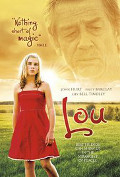
Directed by
Belinda Chayko
82 minutes
Rated M
Reviewed by
Bernard Hemingway

Lou
Synopsis: Lou (Lily Bell-Tindley) lives with her mother (Emily Barclay) and two sisters in rural Northern New South Wales. Ten months earlier her father walked out on them and her mother is struggling to cope. When her grandfather (John Hurt) who has Alzheimer’s moves in Lou makes an unexpected emotional bond with him.With its realistically mundane, low budget. production values Lou looks as if it could have been made in the 1980s or early 90s. With no money to spend on gloss, the attention is firmly on the characters and the drama and this is the film’s strength. What makes it different from those other films is its treatment of its subject matter.
Lou could be reasonably described as a coming-of-age story. Lou is eleven, going on twelve, estranged from her 27 year old mother whom she blames for her father’s disappearance and whom she treats with disdain. Feistily independent, yet, of course, beneath the outward show of toughness, emotionally vulnerable, she is due for a fall. She is also on the cusp of womanhood and it is this aspect which gives the film a quality which it probably would not have had if it had been made twenty years ago. For the producers, Lily Bell-Tindley must have been a remarkable find in this respect.
Reminiscent of the young Brooke Shields, Bell-Tindley has a nymphet-like quality that the camera lingers over in a quite disturbing, and one is not sure if entirely intentional, way. This voyeuristic tendency is so prominent that when the mother’s blokey boyfriend shows up, things feel quite foreboding. However once Lou's Grandad appears, the point of view shifts so that Lou is no longer simply the object of our gaze but an active agent in the story. Here Bell-Tindley is also a great asset, portraying a feline observational quality as she role plays with her grandfather, eventually bringing home with poignancy the adult-making realization that life is not just a game.
John Hurt, joining the list of many fine overseas actors who have appeared in our films over the years, gives a strong performance as the Alzheimer’s-affected Grandad. His skill at portraying the there-but-not-there, befuddled-yet-lucid quality of the disease I am sure will resonate with viewers with parents in similar states. Emily Barclay, rounding out what essentially is a three-hander also does a fine job as Lou’s emotionally-overwhelmed too-young mother whilst Hugh Miller’s cinematography makes a significant contribution to the resonance of the story, his striking cutaways of the burning canefields giving it a sense of connectivity to the seasons of life.
Written by Ms. Chayko, Lou feels as if it is based on fact and even if not so, that is to its credit. It is probably a film that is going to have difficulty in finding an audience, for despite its promotional campaign giving the impression, it is not a children’s movie but rather an understated yet insightful portrait of the drama of the everyday.

Want more about this film?


Want something different?




